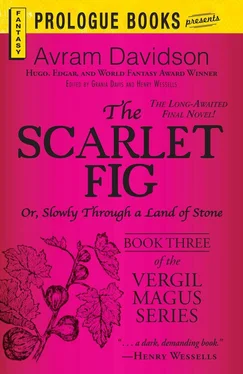Without emphasis she said, “I heard their names inside, how shall I explain it? no: I felt their names … inside of me … as though in a rhythm … Well!” She laughed, gave her head a certain shake, adjusted her head-cloth: already he had come to delight even in the way she would sometimes laugh, sometimes give her head a certain shake, even in the way she adjusted her head-cloth or cap afterwards.
Vergil said, “The Court now has you in its power.”
“Ishtar and Melitta! It has ?” In a less-pretended tone, she said, “You did sound just like an advocate, you know. Have you spent much time hanging around them? In Apollo’s Court, perhaps? Or —”
Now he gave his head a shake (but he wore no kerchief, no attorney’s robe or cap). “Enough time. As much as I could stand. I’ve been a litigant —”
“Oh, that’s bad!”
“ ‘Bad’? Even worse. I was an advocate once, myself.” He made a face.
She made one back. “Were you a good one? Is there a good one?”
By now he had left off wearing robes, trews, tunic; adjusting to the climate, he had on only a short kilt, rather like the Ægyptians wore, but simpler. “A very bad one. And I lost my case. Well, both my cases, including the only one I ever pleaded. My client made quite a thing of paying me the copperkin,” referring to the minimal sum paid even to the losing lawyer; the smallest of small coins, however much debased since original coinage, still it retained its olden name of copperkin. Huldah laughed a slow, rich laugh. “And he said, ‘Take an old scoundrel’s advice and go plant the white spelt and millet in the mountains.’ ” He imitated the client’s imitation of a supposed rustic accent, “ ‘and never come back here no more.’ ”
“And did you? Never go back, I mean?”
He had been gazing at the motes in the beam of sunlight once again, not idly: he had been wondering if this would help him identify whatever kind of tree had made the floor; it was certainly not of cedar … and yet, like cedar, it gave off a characteristic scent. In the concentrated light he could see the grain, like the grain in ivory: it told him nothing. All this in a second, then he answered her question, “Never if I could help it, I assure you. But I still retain the Single Privilege, of course.”
“Oh, of course!” and now she laughed lustily; it was a matter of common knowledge (and, Vergil thought, common was a very proper adjective for it), more or less, that being a qualified advocate entitled one to a single privilege outside the court, to wit, “to break wind in the presence of the cooling-room slave in the Bath at Huta Hippodopolis:” that remote and almost certainly mythical town in which tales of absurdities were commonly set. Huldah lifted her head as she laughed.
He might, of course, simply have asked about the floor.

Scarcely much of a thought he gave more to the ship that brought him. He was aware of shapes on the shore: the vessel itself careened and being scraped, then caulked, perhaps … even … painted. Slow groups lading things aboard once it was righted and floated once again; once or twice vaguely he saw the forms of men carrying burthens ashore from it. A slow trade of sorts was being done; he did not care. One time as an afterthought he’d been aware he’d seen a caffile of men and beasts preparing to be off — off where, he knew he did not know; it was too much to consider, even, that neither did he care; as shadowy as a scarce-remembered dream the thought later flitted through his mind that he’d heard them talk of the need to carry water: so he supposed a journey to or through a dry land was entailed; he passed on …
Huldah … Huldah herself a dry land, no facile lushness there, path-trails thin as filigree; yet a rich land, with many a concealed spring and many an occulted deep, deep well. A rich land, she, lying alone. Her eyes … at first he’d thought them ever so slightly, ever so skillfully painted: but soon he saw that none artifice had done this work. And faint her half-shy, half-sly smile. Never raised, her voice. She: richer than the ransom of a richer city. Sometimes she wore the two silver armils on the one same arm, though not always the self-same arm each time. Hear their tinkling, hear them now and then ringing.
Huldah and he together in her atrium one day, plants in half-buried jars and pots roundabout. She, after drawing lines in the sands in the atrium, straight, curved, wavering: shores, she said. Coasts: she said, slopes; rivers which once had flowed and flowed no more, rivers which flowed yet and always, and rivers which flowed only sometimes. Huldah at length drew another line, and this (she said) was “the long road to the Pass of Gold …” After silence, said she, “It runs through the heartland of Five-Limbed Uluvendas, the Great Bull of the Woods and Plains.” And, after another silence, said she, “Now none know this way save me and thee. Well,” she said, “of course all my people here know it, but, for one thing, scarcely they know that they know it. And what they know, know it or not, they would not betray. Not while three sticks of this house stand together.”
Not while three sticks of this house stand together : surely a figure of speech: Diomedes, good at the war-cry and no mention of Diomedes (who had fought Greeks and Trojans, goddesses and gods) teaching his horses to feed on human flesh in peace or war. Diomedes —
Suddenly he said it aloud, “ Diomedes, good at the war-cry. ”
She looked at him, slightly she moved the slight lines at the corners of her eyes and at the corners of her mouth. “Here!” said Huldah. “He’d need be!”
No word said, a while. Then Vergil: “Come ships seldom here?” he asked. “Black ships, galleys, galleons, carracks made brave with paint of red?”
A gesture (hear her silver bangles sing!). “As thee see. Seldom come ships here…. That is well,” she said. Said she, “Well that it is so.”

Again they were speaking of silver, silver … the pale and shining … there were priestesses who called it The Tears of Diana; clearly they had known it only as droplets to set like so many beads upon the bottom border of a necklace; had never set gaze upon the black or the dark brown matrix, the mother of ore itself from which silver was refined. It was, though, perhaps possible, that they spoke in a slaunting way (safer in Thessalia than in the Thebaid) of the tears of those hundred myriad slaves which toiled in the silver mines of Ægypt to make yet richer the already immensely rich House of Ptolemy. Yet Claud was King of that nation now; if not altogether a philosopher, yet an astronomer and geographer; had he need for the serfdom? or worse than serfdom — for serfs slaved in the sunlight — in the rain, too: yes: but there was no rain in Ægypt nor in the great Garth of Tambuqtoun, where the very houses, seemingly built of slabs and pillars of many-colored marble, were actually wrought of the mines of many-colored salt — was it for crude, rude wish for further wealth that women and men moiled in the mines for salt and silver? Was there no truth in the soft-told tales that this was the common fate of all thought disaffected to the King and Court of this great House of Ptolemy? Surely no one who had measured the earth as with measuring-rods and had seen overhead the clear and glittering stars and counted them all and given them names which had had no names before — Surely King Claud, author of that great book Almageste, might see fit to break the bands binding those bound to toil in darkness. One must hope … and one must hope, as well, some day to learn what any of this had to do with Diana … though to be sure if tears were silver, tears were salt as well. The Fair White Maiden , or Matron occymists often called the moon. Back to the scene before him. “These twain armils or bracelets,” he said, “that is, their silver, may contain some traces of copper as well?” Copper. The Rudy Man . That was the sun. And therefore: Therefore: The Fair White Matron Wedded to the Ruddy Man … Therefore?
Читать дальше












